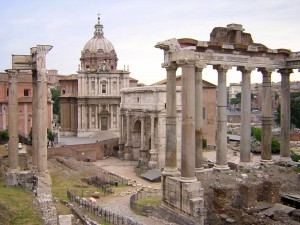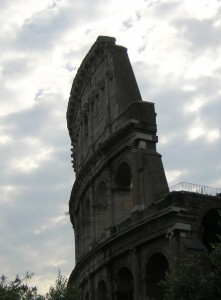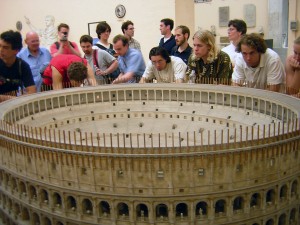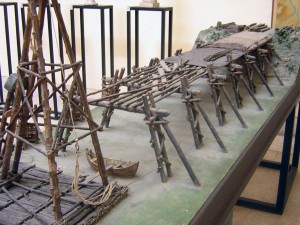Real Fake Centurions

There has just been a crackdown, reported in this article, on the “fake centurions” in Rome, who stand around in classical armor outside the Colosseum or Pantheon or Forum or, perplexingly, St. Peter’s, and ask for tips from tourists in return for posing for photos. Sometimes they claim to be pseudo-gladiators rather than centurions, and one also spots among them the occasional emperor, always tolerably costumed in that combination of leather, metal, plastic and cheap embroidery which would be a praise-worthy costume at a fancy-dress party but embarrassing in a film.
Why does this justify a crackdown? As the article explains, these faux legionaries are fiercely demanding, extending to extortion, often letting you take a photograph and afterwards demanding ten or twenty euros, and it is not so easy to walk away.

It is intimidating, plastic sword or no, to have a burly man in armor edge toward you while loudly demanding money, especially in an unfamiliar place where confusion and the language barrier mean that help is not intuitively obtained. The article cites worse cases, where one might take a tourist’s camera and demand cash for its return, or offer genuine violence, particularly when their beats are threatened. In this article, the actual arrest came when two under-cover officers dressed as centurions themselves and attempted to join the band by the Colosseum, only to be threatened and, eventually, attacked by the established centurions who would not allow newcomers to edge in on their ancient turf.
What struck me about the article, apart from the stereotypically Italian anecdote that an old promise by the government to begin licensing said centurions was followed by many years of complete inertia, was how often the journalist repeated variations on “fake centurion” or “phony gladiator”, as if, separate from the extortion, there is public outrage at the falseness of these impostors.

Is there some corps of real centurions edged out of work by the ersatz legionaries? Has the legitimate gladiators’ union filed suit? Is the government licensing supposed to somehow guarantee that only real ancient Romans stand around outside the monuments to have their photos taken?
On further consideration, it is true that extortion on the part of someone in a legionary uniform does rather besmirch the honor of the patria. Perhaps some sort of test is in order for the license, to prove that the spirit of the legions lives in the applicant’s heart. How shall we do it? Rustle up some Gauls or Dacians and have them storm the Palatine? Introduce a lion into the Colosseum? Have one of the costumed emperors command one of the costumed guards to leap into the Tiber?

There’s still some falseness to these methods, though, staged tests. Eventually the solution dawned. Each applicant should be issued with a provisional license and allowed to begin work. Then in the first week on the job, the licensers bring a standard of said legionary’s legion, complete with banner and glittering plastic eagle, and hand it to some nearby teenagers with no particular instructions. The sight of the standard being leaned on casually, set down in the dust, swung around, and generally played with, will instantly separate the inertia of the “fake centurion” from the righteous rage of the true. Perhaps, for safety in the latter case, the teens should also be issued with some kind of padded armor.

